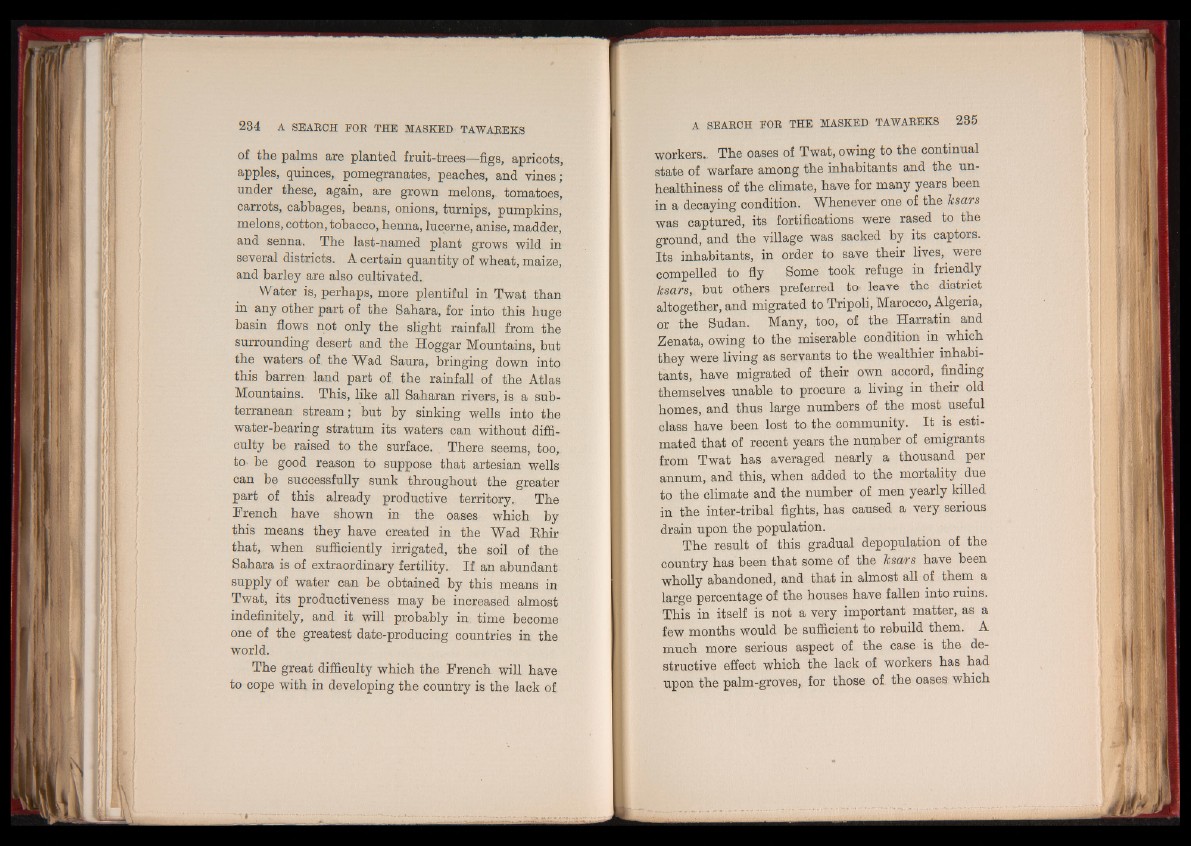
of the palms are planted fruit-trees—figs, apricots,
apples, quinces, pomegranates, peaches, and vines;
under these, again, are grown melons,, tomatoes,
carrots, cabbages, beans, onions, turnips, pumpkins,
melons, cotton, tobacco, henna, lucerne, anise, madder,
and senna. The last-named plant grows wild in
several districts. A certain quantity of wheat, maize,
and barley are also cultivated.
Water is, perhaps, more plentiful in Twat than
in any other part of the Sahara, for into this huge
basin flows not only the slight rainfall from the
surrounding desert and the Hoggar Mountains, but
the waters of the Wad Saura, bringing down into
this barren land part of the rainfall of the Atlas
Mountains. This, like all Saharan rivers, is a subterranean
stream; but by sinking wells into the
water-bearing stratum its waters can without difficulty
be raised to the surface. There seems, too,
to be good reason to suppose that artesian wells
can be successfully sunk throughout the greater
part of this already productive territory. The
French have shown in the oases which by
this means they have created in the Wad Rhir
that, when sufficiently irrigated, the soil of the
Sahara is of extraordinary fertility. If an abundant
supply of water can be obtained by this means in
Twat, its productiveness may be increased almost
indefinitely, and it will probably in time become
one of the greatest date-producing countries in the
world.
The great difficulty which the French will have
to cope with in developing the country is the lack of
workers. The oases of Twat, owing to the continual
state of warfare among the inhabitants and the unhealthiness
of the climate, have for many years been
in a decaying condition. Whenever one of the ksars
was captured, its fortifications were rased to the
ground, and the village was sacked by its captors.
Its inhabitants, in order to save their lives,^ were
compelled to fly Some took refuge in friendly
ksars, but others preferred to leave the district
altogether, and migrated to Tripoli, Marocco, Algeria,
or the Sudan. Many, too, of the Harratin and
Zenata, owing to the miserable condition in which
they were living as servants to the wealthier inhabitants,
have migrated of their own accord, finding
themselves unable to procure a living in their old
homes, and thus large numbers of- the most useful
class have been lost to the community. It is estimated
that of recent years the number of emigrants
from Twat has averaged nearly a thousand per
annum, and this, when added to the mortality due
to the climate and the number of men yearly killed
in the inter-tribal fights, has caused a very serious
drain upon the population.
The result of this gradual depopulation of the
country has been that some of the ksars have been
wholly abandoned, and that in almost all of them a
large percentage of the houses have fallen into ruins.
This in itself is not a very important matter, as a
few months would be sufficient to rebuild them. A
much more serious aspect of the case is the destructive
effect which the lack of workers has had
upon the palm-groves, for those of the oases which